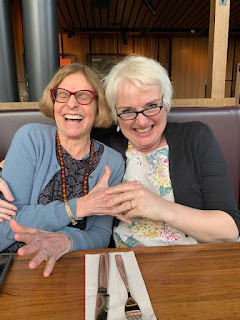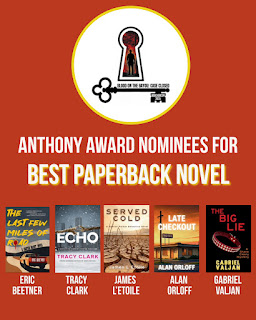Have you found any hints or shortcuts to speed up your writing process? Energize your creativity? Minimize distractions? Do tell.
Okay, I’m going to unload here. Some of these might seem obvious or repetitive, but maybe you’ll find a tip or two that can help. I’ve divided my list into two categories, Tools and Tips.
Ready? Go!
 |
| GET TO WORK! |
Software/technological tools:
1. Text-to-speech — I’m against using AI to create, but it’s okay in my book as an editing aid. I would never use text-to-speech to publish an audiobook, of course, but for my own editing, it’s great. The best editing tool since WordPerfect 5.1 and spellcheck.
I used to use MS-Word for the text-to-speech step, but somehow they’ve changed the voices and I don’t particularly like them. I still use Word to write my books and stories. I tried Google Docs, but the file management was too wonky. It’s a mess, so, reluctantly, I went back to Word.
For text-to-speech editing, however, I now use a paid app. It’s great, but I’m not going to name it here unless they want to pay me for an endorsement… I’m an influencer, after all. (Haha.)
2. iPad — A fantastic tool for a writer. It’s lightweight, I take it everywhere, and write whenever I want. I’m never without it.
3. The Internet — This should go without saying. Truly, writers don’t appreciate what they have here. You can search for almost anything and have your answer immediately. Just be sure to cross check and be sure it’s correct.
4. The Cloud — This has solved my problems of storage and avoiding the loss of files. No more saving to a hard drive or a thumb drive. Those can fail. Another great solution is to email your files to yourself everyday. That way you’ll never lose anything more than one day’s work.
5. Use a thesaurus. Not to find big, fancy words, but to find the right ones. Sometimes you just can’t quite think of the word you want. But it’ll be there in the thesaurus.
6. Use a dictionary to check the exact meanings of the words you find in the thesaurus. Do I really need to list this one? You should check all your words.
7. Keep a spreadsheet to track your progress and words per day. I’ve written about this many times in this space, and I stand by it. It can be a tremendous motivator for writing everyday. Keep your words-per-day average up, don’t break that consecutive-days-writing streak!
8. Use Google Ngram Viewer if you write historicals. You can research which words were in use in millions of publications from 1800-2020. https://books.google.com/ngrams/
Writing Tips/Hints:
9. Turn off auto save in your word processor. At least in Word. Too easy to lose work. Maybe other apps are better at saving temporary backup files, but Word isn’t.
10. Update/save files with new sequential names often, that way you’ll be organized and won’t lose much work, even in the worst of situations.
11. Music — listen to playlists that suit the topic you’re writing about. Writing about London in the swinging 1960s? Then don’t listen to classical music. Immerse yourself in the period.
12. Find a work space and treat it like an office. You go there to work. It can be a café or a library or a room in your house. Maybe even in your car. (Just don’t write in your car outside a school… Just don’t.)
13. Go to bed thinking of your story. It’s a quiet time with no distractions, except the ones in your head. Thinking of your story might just turn off those voices and help you fall asleep faster, too. But before you nod off, you might have a brainwave.
14. Don’t worry about forgetting brilliant ideas you get in the middle of the night. They’re usually not brilliant in the light of day. And if they are great ideas, as Stephen King said, you will remember them.
15. When stuck, remember the old trick of creating conflict in your story. Have two of your characters want the same thing, sit back, and watch the fireworks.
16. At the top of your first page, type “Write really good book here.” Then bold it. And make it a huge font size. It works every time.
17. Bargain with yourself. Make deals—x number of words earns a break or coffee.
18. Write now, check later (research, facts). Don’t get bogged down when you’re in the zone. You can check those details later.
19. Always be imagining your ideal reader as you write/edit. I find this is strangely inspiring.
20. Set deadlines for yourself. They work when a publisher sets them, so why not you?
21. Don’t ever believe in writer’s block. It’s a self-fulfilling prophesy. In fact, writer’s block is actually nothing more than avoidance. I don’t like to exercise, but it’s not “exercise block.” It’s laziness.
22. Stuck in your story? Put hurdles in front of your characters. Be mean to them. They’ll pay you back in spades.
23. Need to name some characters? Look in old phone books. I say “old” because they don’t exist anymore.
24. Want an appropriate name for a character? Check popular baby names for the year your characters were born.
25. Write chapter summaries immediately after finishing the chapter. Helps for writing synopses. Think of it as reverse outlining. Inlining? Out-rigging? Yes, let’s go with that. Out-rigging. It will help you plan future chapters and keep track of action. You may find plot holes too.
26. Stay with your characters, even when you’re not writing. At dinner, in the car, etc. Make them your imaginary friends. They may give you ideas.
27. Start your writing day by correcting previous day’s work. Others have said this and it works. It helps you slide back into the groove.
28. Go to see a play or a classical music concert or an opera or ballet. Cirque du Soleil. Your awe and admiration for so much talent will surely fire up your creativity.
29. Out of ideas? Eat or drink a childhood favorite treat in a darkened room. “Proustify.” Taste, smell, experience it. The memories might stimulate your creativity. If nothing else, you’ll enjoy a trip down memory lane.
30. Consult/revisit Georges Polti’s thirty-six dramatic situations. This will give you a shot in the arm for ideas to ratchet up the action in your story/subplots. https://en.m.wikipedia.org/wiki/The_Thirty-Six_Dramatic_Situations
31. Take a cold shower. That will wake you up and set your synapses to firing.
32. Have a beta reader review your WIP and give you questions, not suggestions.
33. Put a MacGuffin in your story. Even a minor one. It shouldn’t change the plot, and will create tension. “MacGuffin: an object, event, or character in a film or story that serves to set and keep the plot in motion despite usually lacking intrinsic importance.” Think the Maltese Falcon—the physical statuette—which is never found in the book.
34. Learn from Scheherazade how to insert a cliffhanger in your novel. It may save your life.
35. Annotate your manuscript. Leave notes for yourself and/or your editor. e.g. Websites where you found/confirmed some information.
That’s it. I’m done spitballing for now. I hope one or more of these is of use.
Khkjb
























